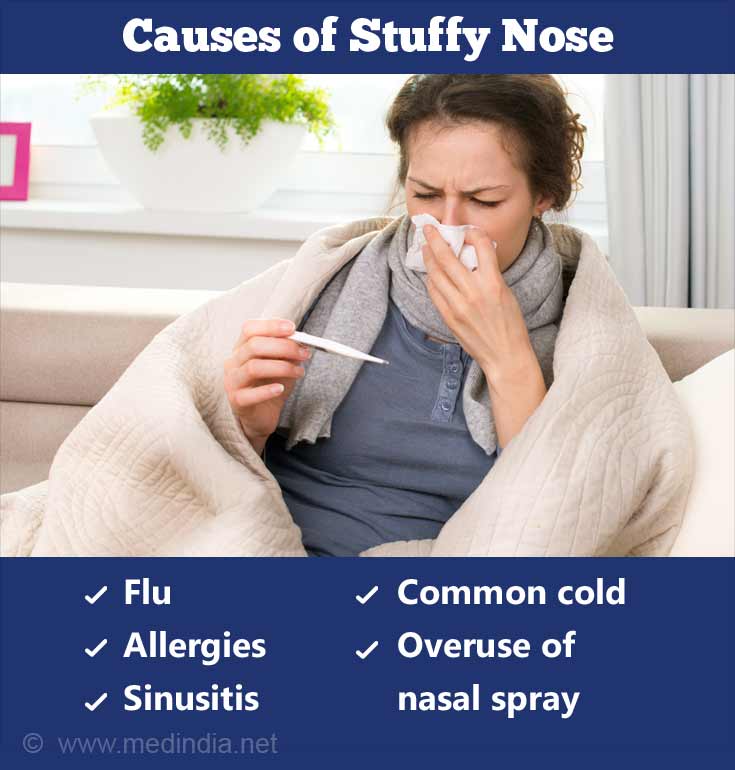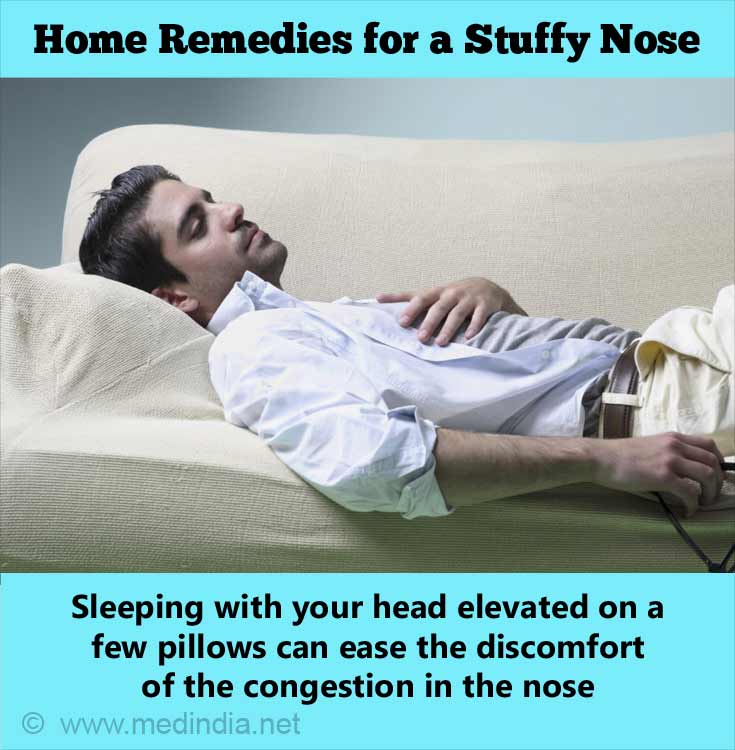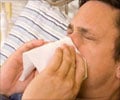A familiar aspect of a congested / stuffy / blocked nose is the inability to breathe in easily. It is an effort to get air to flow through the nasal passages. A stuffy nose occurs due to the inflammation of blood vessels in the tissues, which causes the nose to swell and results in breathing trouble. Often, Mucus is discharged continuously from the nose resulting in a runny nose. If the excess mucus flows into the throat, it results in a sore throat or cough.
A stuffy nose in babies is a problem since it is a deterrent to breathing or nursing for milk. A congested nose may affect the speech, the ears and subsequently, hearing. If one of the nasal passages gets blocked, the infant may have inserted something in that passage. Babies are also afflicted with ear pain and sinus pain when the mucus discharge blocks the eustachian tubes between the nose and the ear. It is also a discomfort for older children and adults.
Causes of Stuffy Nose / Congested Nose / Blocked Nose
There are different causes for a stuffy nose. The causes are based on either an infection, or an allergy, or health conditions. Some of the causes are:
Infection
- Flu
- Common cold
- Sinusitis – Acute and chronic

Allergies
Hay fever, soy allergy, peanut allergy, wheat allergy, milk allergy, pet allergy, shellfish allergy, dust mite allergy, latex allergy and food allergy.
Health Conditions
- Vasomotor rhinitis – The congestion or stuffiness in the nose results from causes other than allergies or infection. Sudden sneezing bouts and the resulting congestion are sometimes caused by alcohol, spicy food, air pollution, extreme emotions or a dry climate
- Pregnancy
- Churg-Strauss syndrome – This condition is characterized by inflamed blood vessels
- Use of nasal sprays for more than 3 days
- Deviation in the nasal septum – The nasal septum or the thin wall dividing the nose is pushed to one side due to a fall or a fight thus, causing narrowing of one side of the nasal passage. This results in breathing difficulty.
- Polyps in the nose – Inflamed outgrowths of the tissues that line the nose.
- Glare and brightness of lights
- Cyclical or cluster headaches – Such headaches occur together frequently and are very painful.
- Drug addiction
- Enlargement of adenoids
- Changes in hormone levels
- Medicines for high blood pressure
Stuffy Nose / Congested Nose / Blocked Nose Home Remedies
There is no treatment for a stuffy nose. The congestion in the nose subsides in due course of time. However, there are different ways to relieve a congested nose.
Raised pillow: In the case of children, the pillow should be raised to elevate the child’s head and ease the discomfort of the congestion in the nose. The legs of the bed may also be raised where the head of the child is placed. When the nose is congested, it is difficult to breathe while lying down or while sleeping at night. For adults and children, sitting in an upright or elevated position eases the discomfort in breathing through a blocked nose.

Drink a lot of fluids: Children above a year old may be given soups and other warm drinks. A teaspoon of honey may be given to treat coughing symptoms. Infants over 3 months old can be given apple juice, water or a hydrating solution. Fluids should be sugar-free.
Humidifier: In dry climates, a humidifier is recommended to moisten the nasal passages and avoid the congestion of the nose.
Steam inhalation: Inhaling steam 2 to 4 times a day helps in relieving the congestion and opens up the nasal passages for a short period of time. One can do this while in the shower. However, hot steam from boiling water should not be inhaled. One can add eucalyptus oil or menthol to the water. Traditional Chinese medicine recommends the use of menthol, moschus, and borneolum to ease the flow of air through the nasal passages.

Warm, moist cloth: A warm, moist cloth can be applied to the face many times in the day.
Adhesive strips: Adhesive strips can be placed on the nose to widen the nostrils and thus, facilitate the movement of air through the nose. Petroleum jelly may be applied below the nostrils to prevent the formation of dry skin under the nostrils.
Removal of mucus: Mucus should be removed at regular intervals. Older children may be asked to blow their noses. However, an aspirator should be used for infants.
Saline sprays: A nasal saline spray is useful in relieving the congestion in the nose. A homemade saline spray can be prepared and utilized 3 to 4 times a day. A nasal saline solution can be prepared as follows:
- 1 cup of warm water + a pinch of baking soda + ½ tsp salt
The solution should be prepared with exact measures to avoid any adverse reactions due to excess salt or baking soda.
nasal sprays can be used for 3 days continuously before discontinuing for the next 3 days. Overuse of nasal sprays is not recommended as it may worsen the symptoms. Children under the age of 2 should not use nasal sprays. However the physician may recommend certain specialized sprays for specific allergies.
Acupuncture: Allergic rhinitis can be treated with acupuncture. There have been many small studies that have observed a beneficial effect of acupuncture. However, the general efficacy of the treatment needs to be confirmed with larger sample studies.

External irritants: Avoid contact with irritants such as cigarette smoke.
Over-the-counter medications: Over-the-counter medications may assist in relieving the congestion in the nose based on the appropriate cause. However, one must exercise caution in using such medications for children below the age of 6 years. A pediatrician’s advice should be availed of with regards to over-the-counter medications.
Antihistamines: Antihistamines can be utilized if nasal congestion occurs due to an allergy. These drugs can make an individual feel drowsy.
Decongestants: A stuffy nose can be dried up with the help of decongestants. However, the use of decongestants should be discontinued following a week if the symptoms persist and one should consult a physician.






